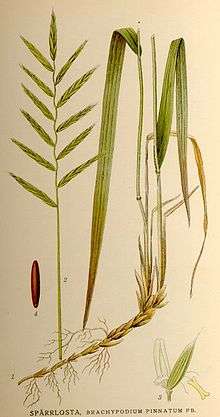Brachypodium
| Brachypodium | |
|---|---|
 | |
| Brachypodium pinnatum[1] | |
| Scientific classification | |
| Kingdom: | Plantae |
| (unranked): | Angiosperms |
| (unranked): | Monocots |
| (unranked): | Commelinids |
| Order: | Poales |
| Family: | Poaceae |
| Subfamily: | Pooideae |
| Tribe: | Brachypodieae Harz (1880) |
| Genus: | Brachypodium P.Beauv. 1812 not Brid. 1826 (a bryophyte) |
| Type species | |
| Brachypodium pinnatum (L.) P.Beauv.[2][3] | |
| Synonyms[4] | |
| |
Brachypodium is a genus of plants in the grass family, widespread across much of Africa, Eurasia, and Latin America.[5][6][7][8][9][10] It is classified in its own tribe Brachypodieae.[11]
Flimsy upright stems form tussocks. Flowers appear in compact spike-like racemes with 5-25 flowers on each short-stalked spikelet in summer. Leaves are flat or curved.[12][13]
According to an October 18, 2010 issue of "Nature Online" Laura Longo, an archeologist at University of Siena in Italy found evidence of Brachypodium and cattail (Typha spp.) residues on prehistoric human grinding tools dated 28,000 years ago from Bilanco in central Italy.[14] A related article authored by Anna Revedin, Biancamaria Aranguren, Roberto Becattini, Laura Longo, Emanuele Marconi, Marta Mariotti Lippi, Natalia Skakun, Andrey Sinitsyn, Elena Spiridonova, and Jiří Svoboda, was contemporaneously published in the Proceedings of the National Academy of Sciences of the United States of America and clarifies that the grain residues resemble Brachypodium, based on a comparison to two modern specimens: "Among these, the grains, which are slightly angular, with hardly visible centric, point-shaped hila and adequate dimensions (in the sample measuring 9–14 μm), appeared very similar to those of Brachypodium or related genera." [15]
- Brachypodium × ambrosii - Spain
- Brachypodium × apollinaris - Spain
- Brachypodium arbusculum - Canary Islands
- Brachypodium bolusii - Lesotho, South Africa
- Brachypodium × cugnacii - Denmark, Ireland, France, Czech Rep
- Brachypodium × diazii - Spain
- Brachypodium distachyon - Mediterranean, Sahara, Sahel, southwest Asia from Portugal + Cape Verde to Sudan + Ukraine + Tibet
- Brachypodium firmifolium - Cyprus
- Brachypodium flexum - Africa from Sierra Leone to KwaZulu-Natal + Madagascar
- Brachypodium humbertianum - Madagascar
- Brachypodium kawakamii - Taiwan
- Brachypodium kotschyi - Turkey
- Brachypodium madagascariense - Madagascar
- Brachypodium mexicanum - Mexico, Central America, Venezuela, Colombia, Ecuador, Peru, Bolivia
- Brachypodium perrieri - Madagascar
- Brachypodium phoenicoides - Mediterranean from Portugal + Morocco to Greece
- Brachypodium pinnatum - Africa + Eurasia from Ireland + Morocco to China + Yakutia
- Brachypodium pringlei - Mexico (Nuevo León, Tamaulipas, Coahuila)
- Brachypodium retusum - Mediterranean + nearby areas from Portugal + Morocco to Ethiopia + Caucasus
- Brachypodium sylvaticum - Africa + Eurasia from Ireland + Morocco to Korea + New Guinea
- formerly included[4]
numerous species once considered members of Brachypodium but now considered better suited to other genera: Agropyron Anthosachne Arundinella Brachyelytrum Brachysteleum Catapodium Cutandia Distichlis Elymus Festuca Festucopsis Lolium Micropyrum Poa Ptychomitrium Rostraria Triticum Vulpia
See also
References
- ↑ painting by the Swedish botanist C. A. M. Lindman (1856–1928), taken from his book(s) Bilder ur Nordens Flora (first edition published 1901–1905, supplemented edition 1917–1926?).
- ↑ lectotype designated by Niles & Chase, Contr. U.S. Natl. Herb. 24: 196 (1925)
- ↑ Tropicos, Brachypodium P. Beauv.
- 1 2 3 Kew World Checklist of Selected Plant Families
- ↑ Palisot de Beauvois, Ambroise Marie François Joseph. 1812. Essai d'une Nouvelle Agrostographie 100-101 in Latin
- ↑ Palisot de Beauvois, Ambroise Marie François Joseph. 1812. Essai d'une Nouvelle Agrostographie plante XIX (19), figure III (3 a-f) line drawings of Brachypodium pinnatum
- ↑ Flora of China, Vol. 22 Page 368 短柄草族 duan bing cao zu Poaceae Tribe Brachypodieae
- ↑ Flora of Pakistan, Brachypodium P. Beauv.
- ↑ Altervista Flora Italiana, genere Brachypodium
- ↑ Sanbi Red List of South African Plants
- ↑ Soreng, Robert J.; Peterson, Paul M.; Romschenko, Konstantin; Davidse, Gerrit; Zuloaga, Fernando O.; Judziewicz, Emmet J.; Filgueiras, Tarciso S.; Davis, Jerrold I.; Morrone, Osvaldo (2015). "A worldwide phylogenetic classification of the Poaceae (Gramineae)". Journal of Systematics and Evolution. 53 (2): 117–137. doi:10.1111/jse.12150. ISSN 1674-4918.

- ↑ Watson L, Dallwitz MJ. (2008). "The grass genera of the world: descriptions, illustrations, identification, and information retrieval; including synonyms, morphology, anatomy, physiology, phytochemistry, cytology, classification, pathogens, world and local distribution, and references". The Grass Genera of the World. Retrieved 2009-08-19.
- ↑ Lord, Tony (2003) Flora : The Gardener's Bible : More than 20,000 garden plants from around the world. London: Cassell. ISBN 0-304-36435-5
- ↑ Callaway, Ewen (October 18, 2010). "Stone Age flour found across Europe". naturenews. Retrieved October 12, 2011.
- ↑ Revedin, Anna; et al. (November 2, 2010). "Thirty thousand-year-old evidence of plant food processing". Proceedings of the National Academy of Sciences of the United States of America. 107 (44): 18815–18819. doi:10.1073/pnas.1006993107. PMC 2973873
 . PMID 20956317. Retrieved October 12, 2011.
. PMID 20956317. Retrieved October 12, 2011. - ↑ The Plant List search for Brachypodium
External links
| Wikimedia Commons has media related to Brachypodium. |